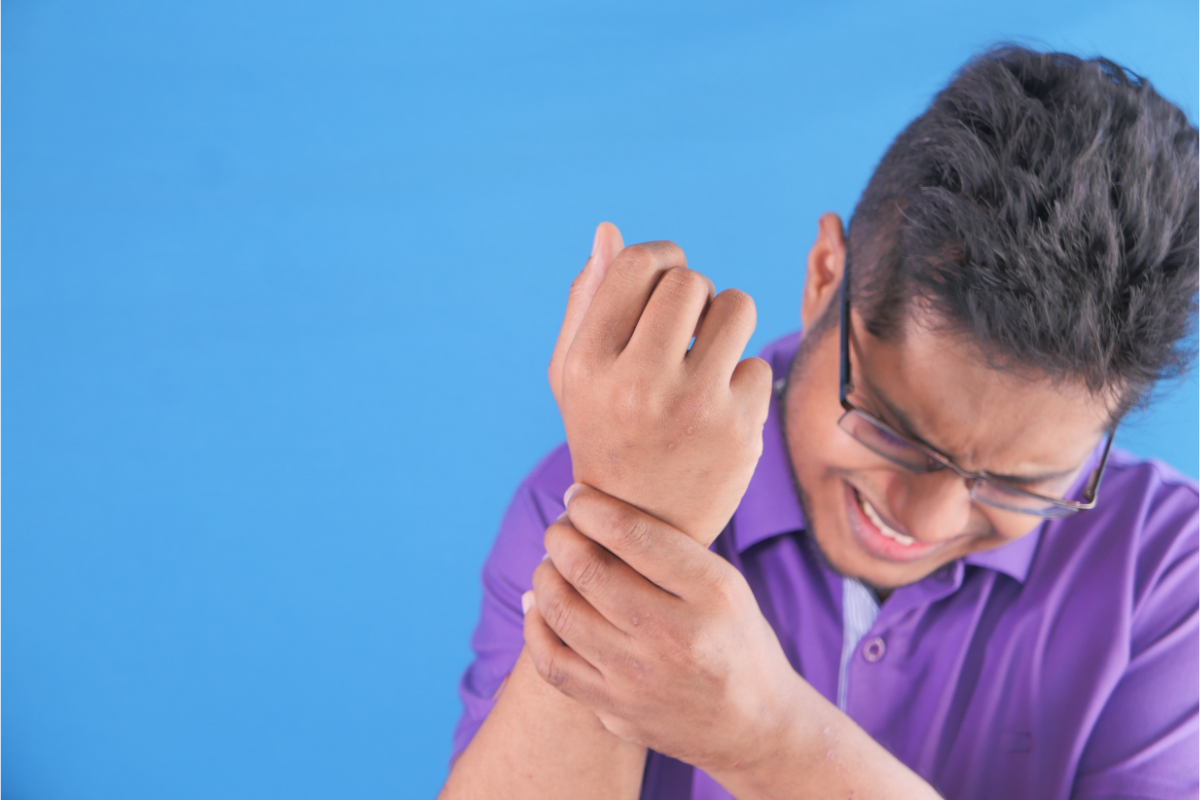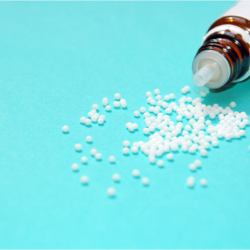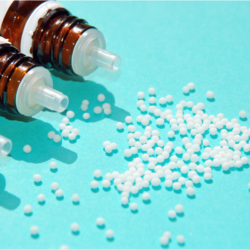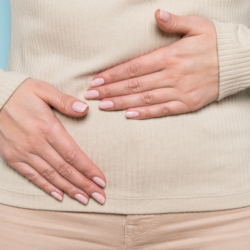Relieving joint, muscle or dental pain with homeopathy: a natural alternative. Homeopathy is an alternative medicine that uses natural ingredients to relieve body aches and pains. It can be an effective solution for joint, muscle or dental pain, without the side effects of traditional medicines.
Homeopathy offers various remedies to relieve joint pain. Rhus toxicodendron is a homeopathic ingredient frequently used to relieve joint pain and stiffness. It can also help with pain after physical activity. Arnica montana is also a popular remedy for joint and muscle pain.
Exercise, fatigue or injury can cause muscle pain. Homeopathy can help relieve these aches using natural ingredients. Arnica montana is an effective remedy for muscle pain and bruising. Magnesia phosphorica is another ingredient commonly used for muscle pain and cramps.
Post-herpes zoster pain is pain that can persist after an attack of shingles. Homeopathy is a natural and effective alternative for relieving this pain. Homeopathic medicines are plant-based and individually selected according to the symptoms. It is important to consult a homeopath online to find a suitable treatment.
Dental pain can be very uncomfortable and painful. Homeopathy can be a natural alternative to relieve this pain. Chamomilla is a commonly used ingredient for toothache. It can also help to calm the nerves and relieve the anxiety associated with visits to the dentist. Toothache, particularly that which is aggravated by heat, can be treated with Coffea cruda, another homeopathic ingredient used.
Homeopathy can also be a natural solution for relieving joint, muscle or dental pain. It is important to talk to a healthcare professional before using homeopathic remedies to make sure they are suitable for your condition.
Relieving muscle pain with homeopathy
Homeopathy is one of the natural treatments that can be used to treat almost all muscles. It offers solutions for most aches and pains, even though muscular pain has various origins. It can be an invaluable ally for sportspeople, whatever their level.
An important point for sportspeople: it can be used to treat muscular pain as part of sporting activities. The competent authorities do not classify homeopathic products on the long list of doping products, and these products have no toxic or iatrogenic side-effects.
Some of the remedies on offer have the virtue of relieving pain and limiting bleeding. They are particularly useful for muscle strains and pulls, and especially in cases of muscle fatigue.
The homeopathic kit should therefore include a certain remedy to prepare for everyday muscular pain, and this applies not only to sportsmen and women, but also to inactive people.
Homeopathy and post-operative recovery
Post-operative recovery is a key stage in the patient’s healing process. As an alternative medicine, homeopathy can play a vital role in this phase, particularly in relieving pain and promoting healing.
- Arnica Montana: Known for its anti-inflammatory properties, Arnica Montana is frequently used to reduce pain, bruising and swelling after surgery. It also helps minimise bleeding and accelerates the healing of damaged tissue.
- Staphysagria: Ideal for pain associated with surgical incisions, Staphysagria helps to calm pain and promotes wound healing.
- Bellis Perennis: This remedy is often recommended for internal pain and deep tissue trauma, particularly after operations such as abdominal surgery.
- Hypericum: Particularly useful for surgical procedures affecting the nerves, Hypericum can effectively relieve post-operative nerve pain.
- Calendula: Used topically, it promotes wound healing and prevents infection.
These remedies can be tailored to the patient’s specific symptoms and individual needs, in consultation with a homeopath. They offer a gentle alternative to conventional analgesics and can contribute to a faster, less painful recovery.
Reducing postherpetic pain with homeopathy
Post-herpetic pain, also known as post-herpetic neuralgia, is pain that occurs after an attack of shingles. This pain can persist for months or even years after the initial illness has been cured. Elderly people are the most affected, as their immune systems are weakened.
Homeopathy can help relieve post-herpes zoster pain. Homeopathic medicines are plant-based and natural. They work by stimulating the body’s immune system to help combat and reduce pain.
Homeopathic treatment of postherpetic pain is tailored to the patient’s individual symptoms. Homeopathic medicines are chosen according to the pain felt, the location and duration of the pain.
The homeopathic medicines most commonly used to treat postherpetic pain include :
- Hypericum perforatum: used for burning, electric or stinging pain.
- Ranunculus bulbosus: used for stabbing pain and pain that is aggravated by movement.
- Mezereum: used for pain that worsens at night and is accompanied by itching.
- Arsenicum album: used for burning pain and pain aggravated by heat.
Homeopathic medicines are taken as granules or drops, two to three times a day.
In conclusion, homeopathy is an effective method of relieving postherpetic pain. It is important to consult a homeopath to find the right homeopathic treatment for each individual. Homeopathy is a natural alternative to traditional medicines and can help to reduce pain effectively and without side effects.
Reducing dental pain naturally
Pain is a discomfort that is difficult to bear, whether it is muscular, abdominal or dental. Homeopaths have developed a number of medicines to help patients alleviate and cope with pain.
Toothache is characterised by bleeding or inflammation of the teeth, particularly the gums, after a broken filling. The person may feel a sharp pain when chewing food. Their jaw may swell and prevent them from speaking properly.
Homeopathy offers a number of alternatives to combat toothache. Tooth decay that is not treated effectively is often responsible for this unbearable pain, which homeopathy helps to alleviate.
It is not possible to heal instantly or with a single drug, but you can relieve the sore area by using certain homeopathic products. It is also a matter of urgency to make an appointment with your dentist in the event of chronic toothache.
How can chronic pain be treated with homeopathic remedies?
Chronic pain is characterised by persistence over a long period, often exceeding three to six months. It can result from a variety of medical conditions such as musculoskeletal disorders, neurological diseases or ongoing tissue damage.
Homeopathy offers a personalised approach to treating these pains. Remedies such as Rhus toxicodendron are used for joint pain exacerbated by dampness or cold, while Bryonia is preferred for pain aggravated by movement. Arnica Montana can be effective for pain resulting from traumatic injuries.
In addition, remedies such as Magnesia phosphorica and Colocynthis are indicated for nerve pain or muscle cramps. Homeopathy also considers the patient’s emotional and psychological state, which is crucial in the management of chronic pain.
It is essential to work with a homeopath for a personalised therapeutic approach, enabling chronic pain to be managed as a whole.
Treating joint pain with homeopathic complexes
Joint pain can have several causes. While frequent or intense aches and pains require you to consult a doctor for appropriate treatment, you can alleviate occasional and moderate aches and pains by self-medicating with homeopathy.
Homeopaths distinguish between different types of joint pain when prescribing treatment, depending on their sensitivity to movement and humidity. The creams and granules offered vary according to the symptoms, and it is best to consult an expert before opting for a curative remedy.
However, it is difficult to make a diagnosis based on symptoms, so it is always essential to consult a professional to rule out serious pathology before embarking on treatment.
Rheumatism in the joints can also be treated effectively with Ledum Palustre, even if the joint is cold to the touch and very swollen. Homeopathic medicines quickly eliminate the sensation of cracking joints.
Homeopathy and stress and anxiety management: The link with physical pain
Stress and anxiety are psychological states that can have a significant impact on physical pain. Not only can they intensify the perception of pain, but they can also contribute to the onset of certain types of chronic pain.
Homeopathy offers a holistic approach to managing stress and anxiety, which are often linked to somatic disorders. For example, homeopathic remedies such as Ignatia Amara and Aconitum Napellus are frequently used to alleviate symptoms of anxiety and acute stress. By reducing these emotional states, homeopathy can indirectly help to reduce physical pain.
Homeopathic doctors take account of the patient’s personality and emotional reactions when choosing the most appropriate remedy. This personalised approach is essential because stress and anxiety can manifest themselves in unique ways in each individual.
In short, by treating the underlying causes of stress and anxiety, homeopathy can play an important role in the management of physical pain, offering a gentle, holistic solution.







